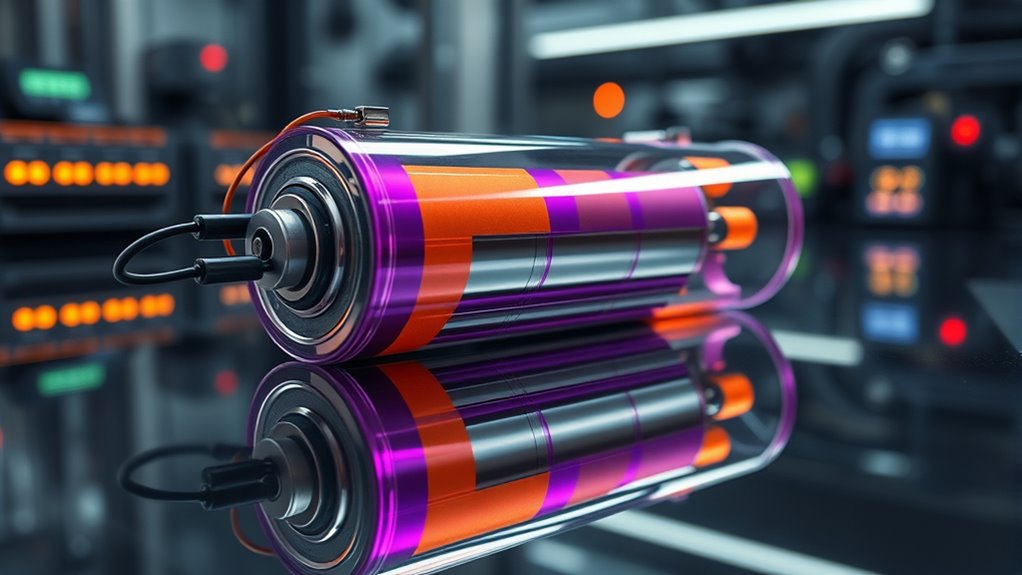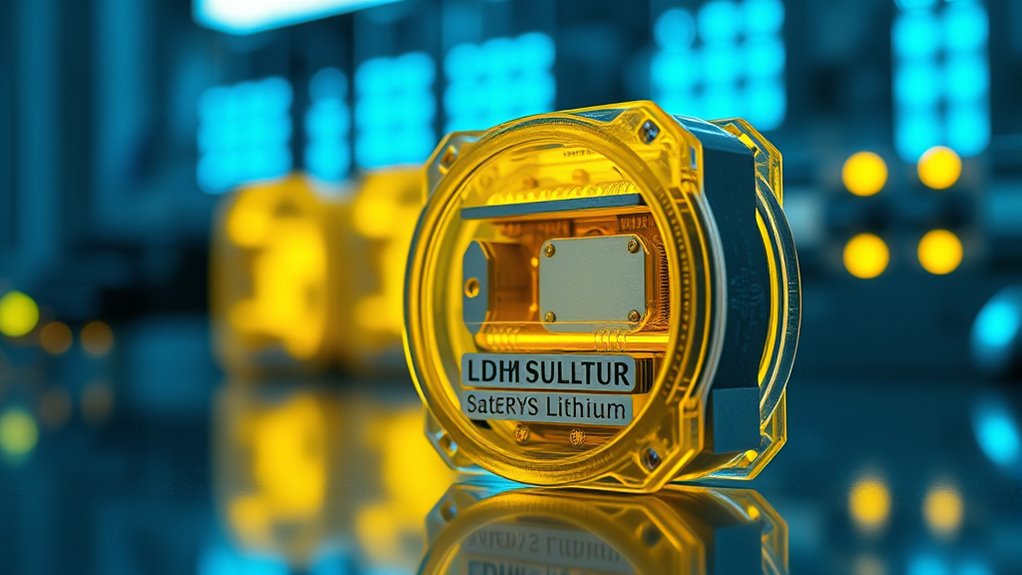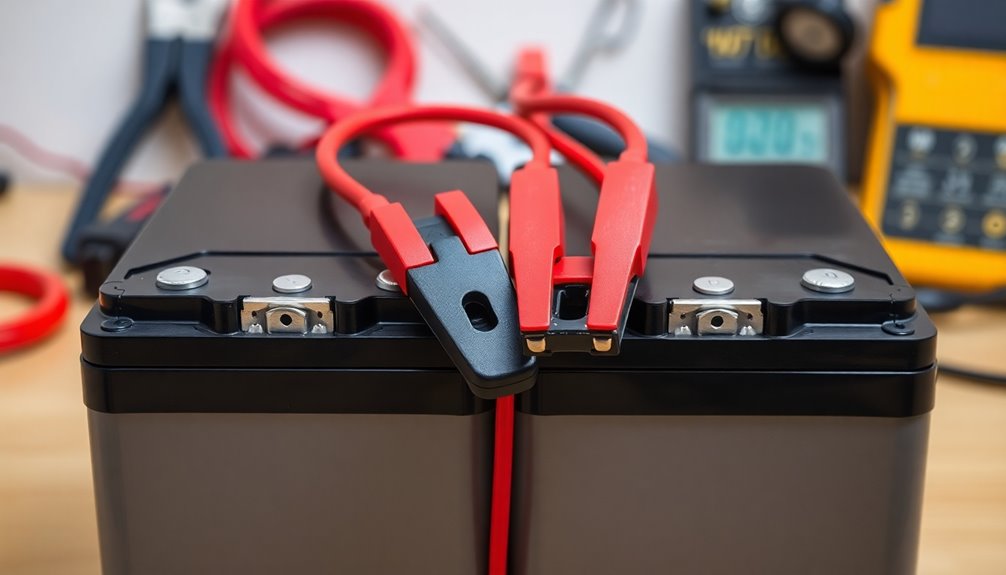Lithium-sulfur batteries are a promising energy storage tech that offers higher capacity and lower costs than traditional lithium-ion ones. They use sulfur, which is abundant, inexpensive, and eco-friendly, making them ideal for portable gadgets and electric vehicles. These batteries can store more energy in less space, enabling longer-lasting devices and lighter vehicles. Although they face some challenges, ongoing research aims to improve their stability and lifespan. Continue exploring to discover how these batteries could reshape your energy solutions.
Key Takeaways
- Lithium-sulfur batteries use sulfur as the cathode, offering higher energy density than traditional batteries.
- They are promising due to their low cost, abundance of sulfur, and potential for lightweight, high-capacity energy storage.
- These batteries can significantly extend device run-time and vehicle range with their high theoretical capacity of 1,672 mAh/g.
- Ongoing research aims to improve stability and mitigate capacity loss caused by the shuttle effect.
- Their development could revolutionize portable electronics, electric vehicles, and grid storage with more efficient, eco-friendly power sources.

Have you ever wondered how future batteries might outperform today’s technology? Lithium-sulfur batteries are emerging as a promising solution, especially because they promise higher energy density and potential cost reductions. Unlike traditional lithium-ion batteries that rely on metal oxides, lithium-sulfur (Li-S) batteries use sulfur as the cathode material. This shift is important because sulfur is abundant, inexpensive, and environmentally friendly. These features make Li-S batteries an attractive alternative for a range of applications, from portable electronics to electric vehicles. Their superior energy density means they can store more energy in a smaller, lighter package, giving devices longer operating times and vehicles extended driving ranges. This is essential as the demand for lightweight, high-capacity batteries continues to grow.
The energy density advantage of lithium-sulfur batteries stems from sulfur’s high theoretical capacity—about 1,672 mAh per gram—far exceeding that of conventional cathode materials. This means that for the same weight, a Li-S battery can store significantly more energy. As a result, you could experience longer-lasting gadgets or vehicles with less bulk and weight. Moreover, because sulfur is abundant and easy to source, the cost of manufacturing Li-S batteries could be substantially lower over time. This potential for cost reduction is key in making clean energy solutions more accessible and widespread. As research advances, the push is on to develop manufacturing processes that capitalize on sulfur’s affordability, ultimately driving down the overall price of batteries.
However, challenges remain before lithium-sulfur batteries become mainstream. The primary issues involve the stability of the battery and the “shuttle effect,” where sulfur dissolves into the electrolyte and causes capacity loss over time. Researchers are actively working on new materials, such as advanced electrolytes and protective coatings, to improve the lifespan and reliability of these batteries. Additionally, addressing the charge/discharge efficiency is critical for commercial viability. If these hurdles are overcome, Li-S batteries could revolutionize energy storage by providing a lightweight, affordable, and high-capacity alternative to existing technologies. You might see them powering your next smartphone, electric car, or even grid storage systems in the future. Their combination of high energy density and the potential for cost reduction could make them a game-changer, helping accelerate the transition to sustainable energy solutions. Essentially, lithium-sulfur batteries hold the promise of delivering more power for less, paving the way for a more efficient and environmentally friendly energy landscape.
Frequently Asked Questions
How Do Lithium-Sulfur Batteries Compare in Cost to Lithium-Ion Batteries?
You’ll find that lithium-sulfur batteries generally have a lower cost comparison to lithium-ion batteries, mainly because their manufacturing expenses are reduced due to simpler materials and processes. While lithium-ion batteries are more established and have higher production volumes, lithium-sulfur batteries use cheaper raw materials like sulfur. This cost advantage could make them more affordable for large-scale applications in the future, although current production costs still need to decrease further.
What Are the Environmental Impacts of Lithium-Sulfur Battery Production?
You might think lithium-sulfur batteries are eco-friendly, but their production isn’t without issues. You’ll face recycling challenges due to complex materials, and raw material sourcing can strain environments, especially with sulfur and lithium extraction. Ironically, while they promise cleaner energy, their manufacturing impacts the planet, requiring careful management to minimize environmental harm. So, even promising tech has a footprint, reminding you that sustainability is an ongoing journey.
How Long Do Lithium-Sulfur Batteries Typically Last?
You can expect lithium-sulfur batteries to last around 300 to 500 charge cycles, depending on your usage and how well you manage cycle stability. Their high energy density means they store a lot of energy in a compact size, but their cycle stability can decrease over time, reducing lifespan. Proper care and advancements in technology are improving their durability, helping them last longer in various applications.
Are Lithium-Sulfur Batteries Safe for Consumer Use?
You’re right to ask if lithium-sulfur batteries are safe for consumer use; it’s a case of “don’t count your chickens before they hatch.” While they promise high energy density, safety concerns like thermal runaway and potential fires exist. Proper storage considerations, such as avoiding extreme temperatures and physical damage, are vital. Manufacturers are working to improve safety features, but always handle them with care to guarantee your safety.
What Industries Will Benefit Most From Lithium-Sulfur Battery Technology?
You’ll see industries like electric vehicle applications and renewable energy storage benefit the most from lithium-sulfur battery technology. These batteries offer higher energy density, making cars lighter and increasing range. They also provide cost-effective, scalable solutions for storing renewable energy, helping to stabilize power grids. As a result, you’ll notice advancements in sustainable transportation and cleaner energy infrastructure, making a significant impact on your environment and daily life.
Conclusion
Think of lithium-sulfur batteries as a powerful new engine, ready to propel your devices further and longer. Their high energy density and eco-friendly nature make them a promising upgrade in the battery world. Just like a river carving through rocks, these batteries could reshape our energy landscape, offering cleaner, more efficient power. If they overcome current challenges, you’ll soon experience a future where your gadgets run smoother and last longer, like a river flowing freely toward endless possibilities.










